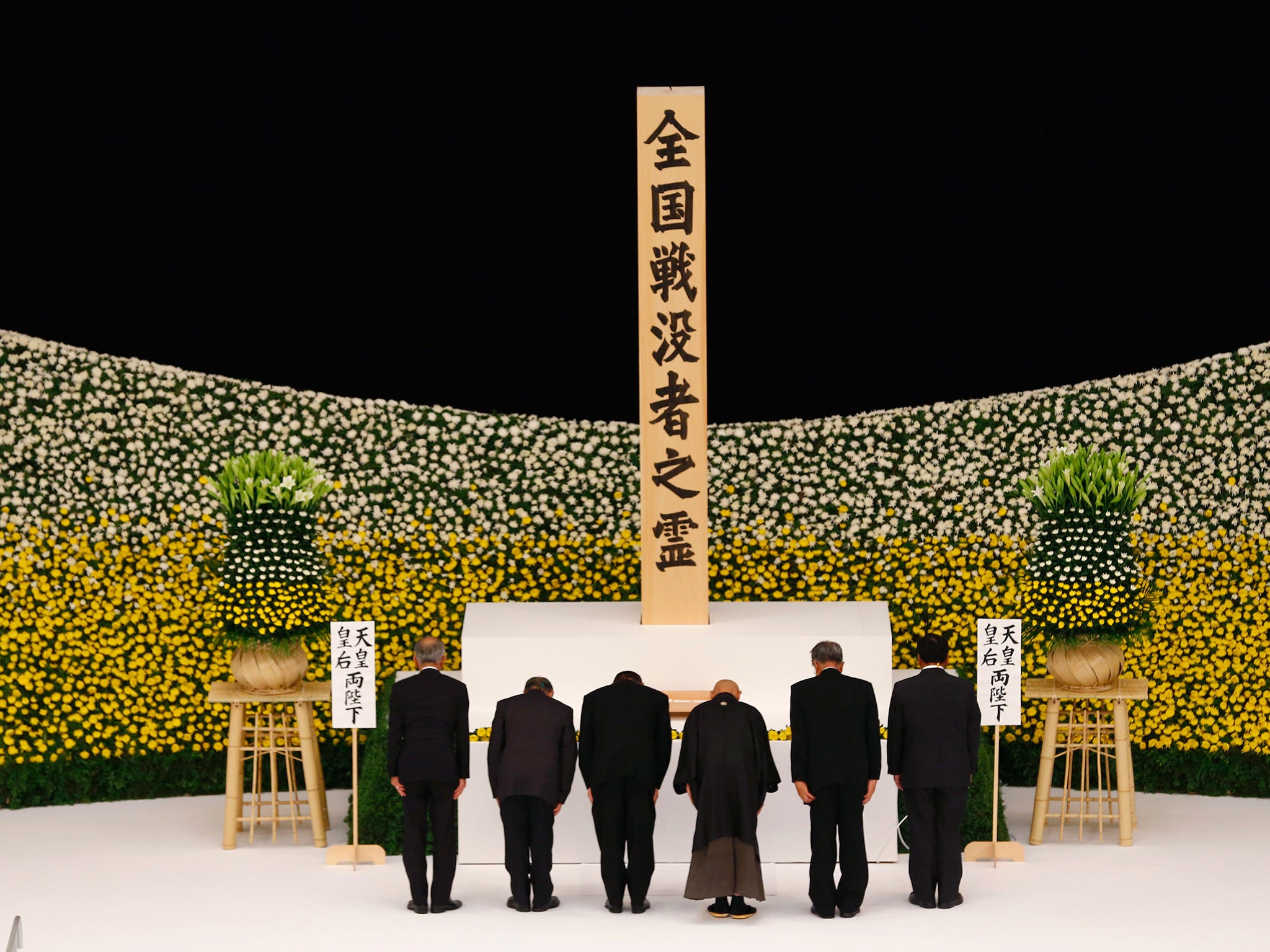Anti-war campaigners and ultra-nationalists hear of Japan's Emperor's remorse
Seventy years after the Second World War ended, thousands respects to the ghosts of the past at Yasukuni Shrine

Your support helps us to tell the story
From reproductive rights to climate change to Big Tech, The Independent is on the ground when the story is developing. Whether it's investigating the financials of Elon Musk's pro-Trump PAC or producing our latest documentary, 'The A Word', which shines a light on the American women fighting for reproductive rights, we know how important it is to parse out the facts from the messaging.
At such a critical moment in US history, we need reporters on the ground. Your donation allows us to keep sending journalists to speak to both sides of the story.
The Independent is trusted by Americans across the entire political spectrum. And unlike many other quality news outlets, we choose not to lock Americans out of our reporting and analysis with paywalls. We believe quality journalism should be available to everyone, paid for by those who can afford it.
Your support makes all the difference.Beneath a burning mid-August sky, thousands of Japanese came to pay respects to the ghosts of the past at Yasukuni Shrine, 70 years after the Second World War ended.
At noon, the Yasukuni crowd fell silent, heads bowed. Exactly 70 years ago, Emperor Hirohito brought the war to an end, asking his subjects to “endure the unendurable”. Yesterday, just down the hill in a memorial service at the Budokan Hall, his son, Emperor Akihito, urged Japan not to forget the war and to promote reconciliation with Asia.
“Reflecting on our past and bearing in mind the feelings of deep remorse over the last war, I earnestly hope that the ravages of war will never be repeated,” Emperor Akihito, 81, said. “Together with all of our people, I now pay my heartfelt tribute to all those who lost their lives in the war, both on the battlefields and elsewhere, and pray for world peace and for the continuing development of our country.”
Mingling with the families and tourists at Yasukuni were ultra-nationalists, some strutting around in the uniforms of imperial soldiers. For most, Yasukuni, meaning “peaceful country”, is a place of pilgrimage for silent prayer, but each year on 15 August, the shrine and its grounds come alive with the iconography of war and Japan’s militarist past. The hinomaru (rising run) flag flutters everywhere.
Visitors run a gauntlet of speakers and petitioners on the walk up the hill to the shrine, which occupies a single square kilometre of central Tokyo. Japan must stop saying sorry, demands one speaker; it committed no war crimes. “The real war criminals were the Americans who bombed Hiroshima and Nagasaki,” he says. School textbooks should stop teaching Japanese children to hate their own country, says another.
Among the pilgrims yesterday was Takuya Nakamura, 29, a secondary school teacher. “I came to pray for an end to wars,” he explained. “The media says this is a shrine to militarism, but it’s not. It’s a place of peace.” Japan could not keep apologising for what happened 70 years ago, he added. “The endless cycle has to stop; I had nothing to do with it.”
Many express admiration for the hawkish Prime Minister Shinzo Abe. In a speech on Friday marking Japan’s capitulation, Mr Abe stopped short of issuing a new apology.
Like many of his recent pronouncements, the Emperor’s apologetic tone yesterday will be taken as a rebuke of Mr Abe.
Yasukuni venerates the kami (divine spirits) of 2,466,000 soldiers lost in all the nation’s wars. Among the names in its Book of Souls are the leaders of Japan’s disastrous wartime campaign, who were secretly enshrined in 1978, a number of them previously convicted as war criminals by an Allied tribunal. The shrine is seen in China and South Korea as a symbol of Tokyo’s wartime militarism. In later years Hirohito stopped going to the shrine, apparently mindful of the diplomatic repercussions. Akihito has never officially visited.
In the speakers’ tent, Tomomi Inada, a politician considered close to Mr Abe, predicts that the emperor will one day return. “It is time to restore Japan’s honour,” she says.
Avoiding the sun in the shadow of Yasukuni’s giant gates, Hajime Akiyama, a salary man, said it was his first visit, with his wife and daughter. “We want to pay our respects to the people who died,” he said. Japan was changing, he added, and Mr Abe was right to shrug off seven decades of pacifism – the prime minister is looking to play a greater security role in Asia in the face of a rising China. “It’s better to be prepared for the worst.”
Join our commenting forum
Join thought-provoking conversations, follow other Independent readers and see their replies
Comments